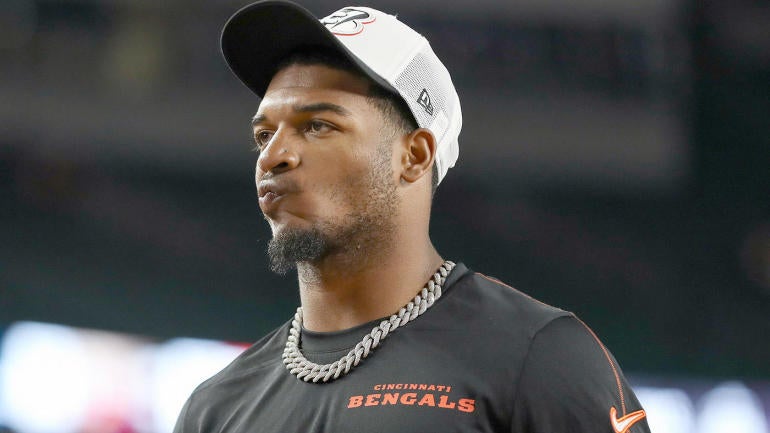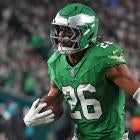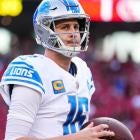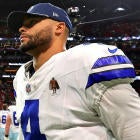
The "hold-in" became a new tactic for players trying to get contract unhappiness addressed because of the harsh economic consequences of a holdout under the 2020 NFL collective bargaining agreement.
Teams are required to fine players who aren't on rookie contracts, such as New York Jets edge rusher Haason Reddick and San Francisco 49ers offensive tackle Trent Williams, $50,000 per day with training camp absences. Players on rookie contracts, like Dallas Cowboys wide receiver CeeDee Lamb, are subject to a $40,000-per-day fine.
There's an additional penalty of one week's base salary (1/18th of salary) for each preseason game missed with players signing contracts as unrestricted free agents (Reddick and Williams) or for first-round picks playing under their fifth-year option (Lamb).
According to the CBA, training camp runs from a team's mandatory reporting date through the Sunday before the first regular-season game (Sept. 1) for daily fining purposes. Under previous CBAs, there was more latitude for fines to be reduced or waived. Fine forgiveness or reduction is only allowed for players under rookie contracts with the current CBA.
A player will report to training camp, but won't practice or have limited participation in an effort to get a new contract as a hold-in. These fines are avoided with attendance. For instance, Pittsburgh Steelers edge rusher T.J. Watt was essentially a spectator during training camp and preseason practices in 2021 until a few days before the regular-season opener when he became the NFL's highest-paid non-quarterback.
Two wide receivers staging hold-ins
There are two prominent hold-ins this preseason. Both are wide receivers.
Brandon Aiyuk, who is scheduled to make a fully guaranteed $14.124 million in 2024 on a fifth-year option, expressed his displeasure with his contract situation at various points during the offseason on different social media platforms. He skipped offseason workouts and subjected himself to a $101,716 fine for missing the entire three-day mandatory June minicamp.
Aiyuk's frustration reached a boiling point when he requested a trade from the San Francisco 49ers shortly before the start of training camp. The 49ers gave Aiyuk's representatives permission to negotiate a new contract with interested teams in an effort to help facilitate a trade.
The Cincinnati Bengals have downplayed Ja'Marr Chase's hold-in. Head coach Zac Taylor claimed a "good plan was in place" for Chase when asked about the three-time Pro Bowler's lack of participation in training camp despite passing the preseason physical. Chase was absent from offseason workouts until attending June's mandatory minicamp without partaking in team drills other than walkthroughs.
The 2021 fifth overall pick missed practice last Tuesday. It is unknown whether Chase's absence was excused.
Chase is under contract for two more seasons because the Bengals exercised a fully guaranteed $21.816 million fifth-year option with him for 2025. He is making a fully guaranteed $4,862,679 this year consisting of a $1.055 million base salary and a $3,807,679 third day of training camp roster bonus, which has already been paid.
Chase situation has chance to get explosive
A hold-in only has a chance to be successful with a team's cooperation. A team has plenty of tools at its disposal when unwilling to be a participant. This shouldn't happen with Aiyuk because he is likely to either sign a contract extension with the 49ers or get a new deal as a part of a trade to the Pittsburgh Steelers.
There is potential for Chase's situation to become explosive. Bengals president Mike Brown made conflicting statements about a month ago at the team's annual media luncheon ahead of the opening of training camp. He suggested that a deal is unlikely this year while also recognizing Chase's importance to the franchise.
"It's not so likely that this is the good time to negotiate," Brown said. "The offseason is a better time for that and we're going to try to keep focused on the football part. I'm not going to rule anything out, but I will tell you that the die has probably been cast."
Brown went on to say about Chase: "He's a key player next to Joe [Burrow]. He's our next one. He knows that. We know it. This may take a while. We are going to bend over backwards to get it done. I can't tell you when."
Chase is believed to be looking to top former LSU teammate Justin Jefferson's deal with the Minnesota Vikings that reset the wide receiver market where he become the NFL's highest-paid non-quarterback in the process. Jefferson signed a four-year, $140 million contract extension averaging $35 million per year during the early part of June. His deal established new wide receiver records for overall guarantees and the amount fully guaranteed at signing respectively with $110 million and $88.743 million. The $88.743 million is also the most ever fully guaranteed at signing for a non-quarterback.
Chase and the Bengals have been tight-lipped about whether any progress is being made on a new deal. There has been some speculation that Chase won't play without a new contract.
Best options for Bengals, Chase amid hold-in
If waiting until 2025 is Cincinnati's preference, it wouldn't be surprising for the Bengals to start using the tools at their disposal to try to end Chase's hold-in as the Sept. 8 regular-season opener against the New England Patriots approaches. The Bengals could remind Chase in writing that he is expected to fulfill his contractual obligations given he passed the preseason physical.
A breach or violation of Paragraph 2 (Employment And Services) in the NFL Player Contract could be alleged. The most relevant portions of Paragraph 2 state:
"He [Chase] agrees to give best efforts and loyalty to the Club. …Player will report promptly for and participate fully in Club's official mandatory minicamp(s), official preseason training camp, all Club meetings and practice sessions, and all preseason, regular season and postseason football games scheduled for or by Club."
A specific schedule of participation expectations could be outlined where failure to comply would result in the Bengals beginning to exercise their rights under Chase's contract and the CBA. Article 42 of the CBA outlines the discipline a team can impose on players for various violations.
Chase would run the risk of being cited for a conduct detrimental to the team infraction by continuing the hold-in after receiving the written warning. The maximum penalty for conduct detrimental is a fine of one week's salary, and a suspension without pay for four weeks.
Chase would be out five weeks worth of his $1.055 million salary, which is $293,056, with the most severe discipline for conduct detrimental. A portion of Chase's signing bonus and the $3,807,679 roster bonus would be at risk with the Bengals electing to enforce those penalties under the CBA. The Bengals would be entitled to recoup 4/18ths of the $4,943,571 in proration of Chase's $19,774,284 signing bonus attributed to 2024. This is $1,098,571.
The standard of recoupment is different for the 2024 roster bonus. Recoupment is based on the remaining contract years with these bonuses. Since Chase is under contract through 2025, his roster bonus would be divided by two before applying the 4/18ths standard like with the signing bonus. Chase's potential loss in 2024 roster bonus would be $423,075.
This type of conduct detrimental violation would be costly. Chase would be out $1,814,702 with the Bengals asserting all of their rights.
Chase's best bet of continuing his hold-in if Cincinnati stops being complicit is having a mysterious, hard-to-dispute injury a couple days after returning to practice. A disgruntled Jalen Ramsey essentially had a hold-in during the middle of the 2019 season by missing three games primarily because of a "back ailment." Ramsey was interested in a new contract. He got his desired change of scenery by forcing a trade from the Jacksonville Jaguars to the Los Angeles Rams.
Even if the Bengals are able to squash Chase's hold-in by threatening him with discipline, there could be ramifications that impact the success of the season. Without a new deal, Chase might attempt to protect to himself by erring on the side of caution with any injury no matter how minor. For example, a soft tissue injury or ankle sprain would be given sufficient time to heal rather than rushing to return to action at the earliest possible instance. There's a difference between being healthy and healthy enough to play. There were allegations that Baltimore Ravens quarterback Lamar Jackson's inability to return from a late-season left knee injury in 2022 were related to his contract.
One thing that shouldn't happen is Chase walking out since he reported to training camp. It can lead to some dire consequences. When this occurs, a team can send a player a letter warning him that he can be put on the reserve/left squad list after five days if he hasn't returned, which would prevent him from playing for the rest of the season. The player's contract would also toll where it would be frozen and resume the next year.
Chase's desire for a new contract is understandable. The other two wide receivers taken in the top 10 of the 2021 NFL Draft have already gotten new deals -- 10th overall pick DeVonta Smith signed a three-year, $75 million extension with the Philadelphia Eagles during the middle of April, while sixth overall pick Jaylen Waddle received a three-year, $84.75 million extension from the Miami Dolphins at the end of May. It remains to be how Chase's situation will unfold over the coming weeks.
















